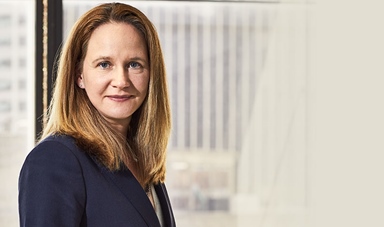Loading component...
At a glance
- Joined OFX as CFO in 2017.
- Formerly with BT Financial Group’s wealth arm, running the analytics and insights team.
- Prior to that, spent 15 years at General Electric, five of which were spent overseas.
- Revenue and profit: for the previous financial year, revenue was A$128.7 million and underlying profit was A$21 million.
- Team: 380 employees in seven locations around the world, 20 of whom are in the finance and treasury department. Most are located in Sydney, with some staff in London, Toronto and San Francisco.
My role: the daily edit
As the CFO of a listed business, my duties include understanding the financial health of the company, interacting with investors and analysts, meeting with advisers and working with our finance and treasury teams to support the business to deliver its growth commitments, while also managing risks in the portfolio.
My favourite part of the day is 4pm, when I meet with the CEO, COO, CMO and regional leaders to discuss the company’s performance.
We look at upcoming economic announcements and what’s changing in global markets that could shift the exchange rates at which clients transact. It’s a great way to learn because it’s a really safe environment. We spend time testing hypotheses and, if what we’re doing isn’t working, we’ll pivot to a different strategy to ensure we deliver growth.
Brexit is an example. We are proactive with customers in explaining the different votes and each potential outcome. With this knowledge, our customers have the information to lock in their next transfer.
Game changers: joining a listed company
I’d never been the CFO of a listed company before being appointed to OFX. I’d never talked to analysts or investors or worked with boards.
From a personal growth perspective, winning this role was like drinking from the fire hydrant. I had to do a roadshow two weeks into the role and present the financials with a high level of detail and answer questions from the market.
I spent the first two weeks in the job on the phone with customers, understanding the product. I also did detailed financial reviews with the team to dig into what’s underneath the financials, how they work and both leading and lagging metrics.
A great leading metric in our business is the number of clients who register with us, as this is an early indication of future revenue. Spending time with customers also allows me to completely understand the emotion in the product and why they’re using it.
I also signed up for and traded using four competitor products to understand what’s unique to OFX, which is that we’re 100 per cent digital with a human touch. Some of the competitors do straight-through digital processing, but there’s no one to call if there’s a problem. We’re not like that.
My challenges: high regulatory standards
A high level of regulatory scrutiny and change, which facilitates new business models, is a huge challenge. We spend lots of time with regulators and our banking partners, making sure we’ve got the highest possible regulatory standards.
Product development is another challenge. We’re always looking at new ways to help customers face the global market. We look at what customers want and release new products into the market, then we pivot and test as we build.
Lessons learned and best advice
1. Find strength in numbers
Use the finance team to coach and support the business. Finance professionals have a real strength in numbers and are great at telling a story with numbers. The role of finance is to partner with different people across the firm to challenge the business to look at alternatives to achieve our goals.
2. Look to the future
Data, analytics and commercial acumen are key. Rather than communicating where the company has been, talk about where it’s going. When we present our financial results, we look at how we performed the previous month and then what the next few months look like, including opportunities that could deliver income. We share that with the leadership team and each item gets an owner and an action, so the team knows exactly what its contribution will be in the coming months to deliver the results to which we have committed.
3. Understand your customers
Take time to listen to and participate in customer phone calls. I also go on sales calls and trial competitor products. This gives you a wealth of information and allows you to make well-rounded decisions based on more than just a financial perspective.
4. Seek advice
Create a great network of professionals to seek and share advice. The decisions a CFO needs to make are broad, and it is really useful to be able to share ideas and thoughts. It’s a two-way street and you’ll be surprised at the support and guidance you get when you start to share thoughts and insights with others.

